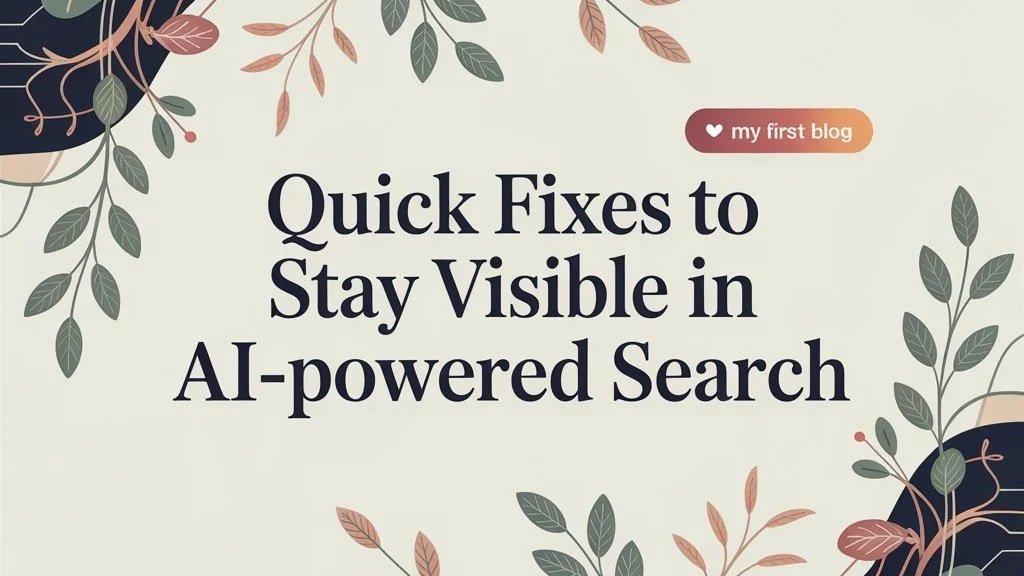Modernize Your Website for AI Search
Overview
Search is changing fast and your website needs to be readable for AI tools. Google searches are decreasing, while ChatGPT searches are increasing. But few of those searches ever reach an organization’s website because more than half of US Google searches end with zero website clicks, meaning users got their answers directly from an AI Overview.
Why this matters for organizations
Online discoverability is important, from parents looking for after-school programs to funders researching your impact. As AI models summarize more of the web, your content needs to speak to both humans and AI algorithms.
To stay visible in the AI era, your site must load fast and use structure so AI can interpret your work. Be transparent about how AI tools should use content on your site, privacy, and data use, especially if children engage with your site.
Basic Tips
Immediate steps you can take to make your site more AI-friendly right now.
1️⃣ Fast Loading
Ensure your site loads quickly for efficient AI crawling. Pages that load slowly may be skipped or only partially summarized. Use Google Page Speed Insights to test and fix lagging pages.
2️⃣ Structured Content
AI Overviews and LLMs only understand what they can clearly see. AI tools rely on clear logic for heading hierarchy (Heading 1 → Heading 2 → Heading 3) to demonstrate content structure and importance, use bullet lists for programs or services, include descriptive alt text for images, link to your other pages to show relevance, and create an FAQ page.
Impact: I asked ChatGPT about what a client/organization did, the response was accurate. Then, I asked, “Does this organization offer programs for kids?”, it confidently said no, although they do offer programs directly for kids. This issue is an opportunity to ensure references to that program are structured in a way that AI tools will correctly process and reference it accurately.
3️⃣ Keywords & GEO (Generative Engine Optimization)
Determine keywords and phrases that users will use when hoping to access your content. Use language your audience naturally types or speaks to have your website show up in search or be cited in an AI Overview. Tools like AnswerThePublic visualize real search phrases: “How to start a school garden program?” or “Climate change lessons in California.” Build content/FAQs that answer those questions in concise, list-friendly paragraphs.
Example: AnswerThePublic shows that “How to start a school garden project?” is more frequently searched than “How to start a school garden program?”. This means using the phrase “school garden project” throughout your website and adding a question and answer to an FAQ webpage can direct more people to your site/improve your content visibility in AI Overviews.
AnswerThePublic results for common phrases and questions searched that are related to the question, “How to start a school garden program?”
Advanced Tips
1️⃣ Schema
After updating your webpage content with headers, bullets, and other formatting (e.g.; bold, italics), attach the document to an LLM/ChatGPT and prompt it to turn the attached content into schema mark up (JSON, which is basic code), and enter that into the back end of your webpage. JSON is like a special way of writing lists and facts so computers/AI can understand and share information.
Structured content is key: over 72% of first-page Google results use schema markup.
2️⃣ Website Audit
💡Run a free audit to review your site structure, page speed, backlinks, and schema, it will also identify where AI Overviews might misread your site.
3️⃣ Compliance & Trust
It is a good time to revisit your Terms and Privacy Policy to acknowledge how AI tools should use content on your website. Pro tip: if you collect data from users (anyone in the US and most countries), you are required to have a Privacy Policy. Transparency builds trust and keeps you compliant. A good Privacy Policy discloses:
How AI tools can/cannot use content on your site.
What data you collect and why (email addresses, names).
Whether you use analytics or AI tools to process data (even Google Analytics).
How users can request deletion or opt out.
Lawyer and law consultant, Monica, recently posted about what can happen when data privacy practices are not ethical/transparent. ⚠️ If your site serves children or collects data from children, you are legally required to include a COPPA-compliant statement.
The web is shifting from a network of links to a network of answers. For nonprofits, that’s both a risk and an opportunity. By making your website readable to AI, you ensure your mission remains discoverable in the era of generative search!
Contact me to work together or fill out this form to get info on future AI office hours. Hope to see you there!
Last edited: 10/25/25


